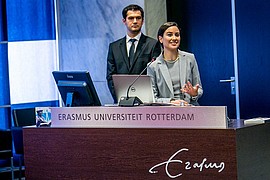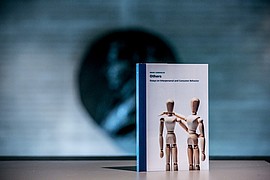PhD Defence: Irene Consiglio

In her dissertation ‘Others. Essays on interpersonal and consumer behaviour’, ERIM’s Irene Consiglio investigates how consumers rarely realize how much principles governing the way they interact with other people may affect not only their interpersonal behavior, but even their consumer behavior.
Irene Consiglio defended her dissertation in the Senate Hall at Erasmus University Rotterdam on Thursday, 3 March 2016 at 11:30. Her supervisor was Prof. Dr. S.M.J. van Osselaer. Other members of the Doctoral Committee were Prof.dr. S. Puntoni (RSM), Prof.dr.ir. P.W.J. Verlegh (VU Amsterdam), and Prof.dr.ir. K. van Ittersum (Rug).
About Irene Consiglio

Irene Consiglio was born in Palermo, Italy, on August 24th 1983. She received her Bachelor Degree (cum laude) in Economics and Management of Arts, Culture, and Communication, at Bocconi University, and her Master’s degree (cum laude) in Marketing at Rotterdam School of Management, Erasmus University. Before starting her Ph.D. she worked in the Marketing units of different cultural institutions and associations in Italy and Greece. In 2009, she started her Ph.D. in Marketing at the Erasmus Research Institute of Management. Currently, her main research interests are consumer-brand relationships and transformative consumer research. She has presented her work at several international conferences – such as the Association for Consumer Research, Society for Consumer Psychology, and European Marketing Academy conference. She was a visiting Ph.D. student at Harvard Business School in 2011. In September 2015, she started her new job as an Assistant Professor of Marketing at NOVA School of Business and Economics, Lisbon.
Thesis Abstract

Consumers rarely realize how much principles governing the way they interact with other people may affect not only their interpersonal behavior, but even their consumer behavior. In this dissertation, I investigate this general issue in three chapters. In chapter 2, I propose that consumers with low self-esteem become wary of new relationships with alternative service providers if they experience service failures in a current service relationship, whilst consumers with high self-esteem do not. In chapter 3, I define brand flirting as consumers’ casual interest in or short-term experimentation with a competitor to a favored brand, and I examine the consequences of this minor consumer infidelity. In chapter 4, I move away from consumer loyalty and commitment, and examine a different behavioral outcome: word-of-mouth. In this case, the context of the research is completely social, as I investigate the effect of environmental crowdedness on the likelihood that consumers engage in information sharing, which is a form of interpersonal communication that is very relevant for marketing purposes.
This research has managerial implications for professionals in the area of marketing and public policy. From a theoretical point of view, this dissertation contributes to research on brand relationships, by identifying tensions between multiple brand relationships (with current and alternative brands), and by investigating consumers’ vulnerabilities that shape these relationships. Moreover, this research contributes to literature on information sharing by investigating how an unexplored contextual factor, namely crowdedness, affects consumers’ propensity to share information with others.
· View and download Irene's dissertation
Photos: Chris Gorzeman / Capital Images


